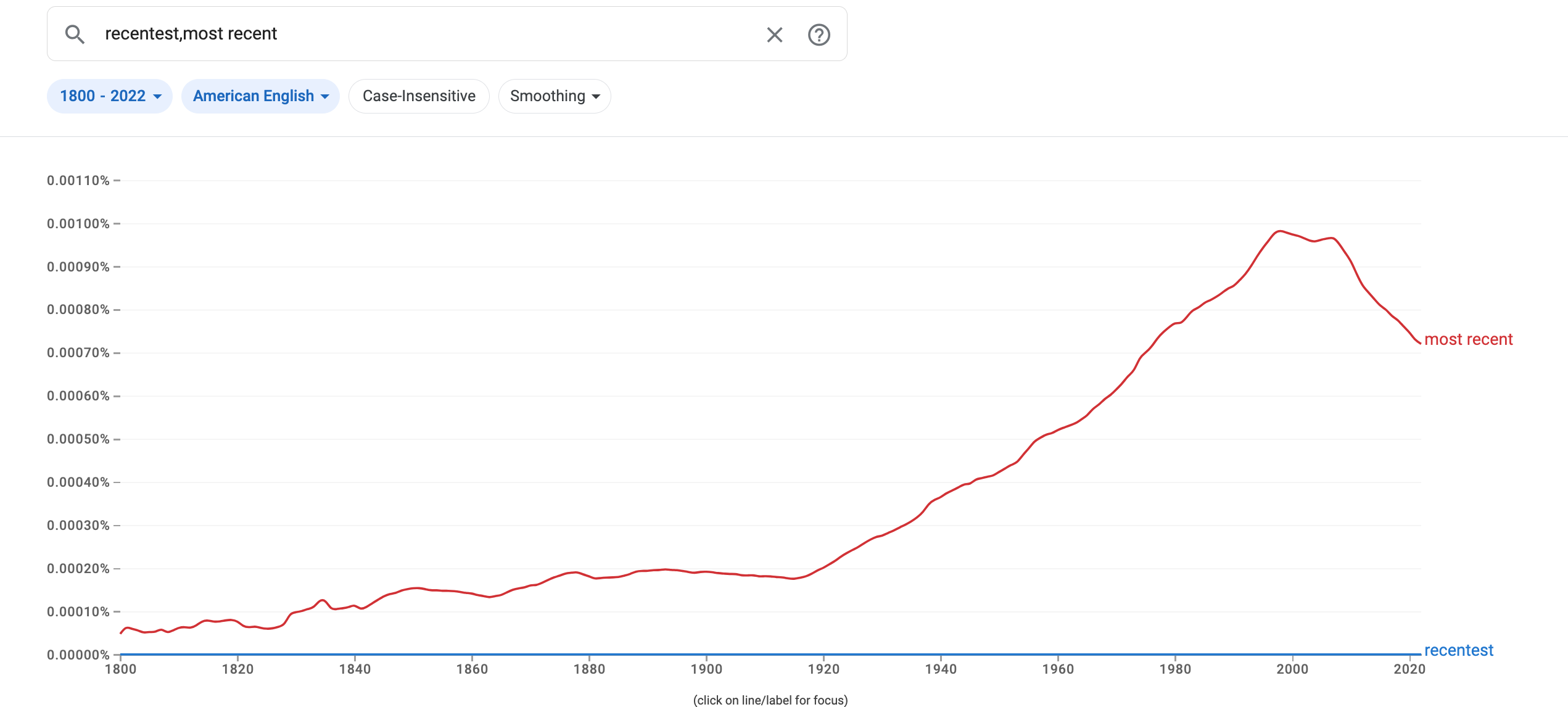Would it be proper to use the term recentest? 'Most recent' sounds correct but I looked up recentest and it seems to be a valid word.
-
1Where did you look it up?– TimRCommented Oct 26 at 23:36
-
If you find a sentence or a word on the web and you want to ask whether it is acceptable/grammatical you should at least post a link or name the source. I don't know... shrugs– Mari-Lou ACommented Oct 27 at 9:05
-
There is a rule: if a word has one or two syllables, est is OK. However, there are exceptions based on usage. This is one of them: the most recent. [Please be careful with spelling.]– LambieCommented Oct 27 at 14:35
3 Answers
As far as I know, "recentest" is not a generally recognized English word, and I can not find it in any of the common/standard dictionaries. I'm not sure where you "looked it up", but I do not believe that source is correct.
The correct superlative form for "recent" is "most recent". "Recentest" sounds very wrong to my ear (and several other people I just asked, too), and I think most people would agree that it is not actually grammatically correct.
-
1en.wiktionary.org/wiki/recentest “superlative form of recent: most recent” unless you want to infer Wiktionary is a non-standard dictionary Commented Oct 27 at 9:07
-
@Mari-LouA I basically agree with this answer and find that wikitionary is not so reliable. If I were to hear it spoken, I'd roll my eyes. :). The fact is that it is not "grammatically" incorrect. It's just trashy.– LambieCommented Oct 27 at 14:48
-
The OED references "Garangeot ... who is one of the recentest Writers." From 1731, G. Martin in Philosophical Transactions 1729–30 (Royal Society) and has an example of "recenter" from Walter Savage Landor in 1846.– Stuart FCommented Oct 27 at 15:30
The long-established superlative form of recent is most recent, it is the only form learners should use in speaking and writing, as confirmed in this ngram chart comparing the two superlatives.
 Ngram: comparing the frequency of “recentest” and “most recent” from 1800 to 2022
Ngram: comparing the frequency of “recentest” and “most recent” from 1800 to 2022
The usage of recentest would be justifiable, only when quoting something such as Herman Melville's Moby Dick (1851). Coincidentally, it is one of the most frequent instances recorded by Google Books.
The same waves wash the moles of the new-built Californian towns, but yesterday planted by the recentest race of men, and lave [wash] the faded but still gorgeous skirts of Asiatic lands, older than Abraham; while all between float milky-ways of coral isles, and low-lying, endless, unknown Archipelagoes, and impenetrable Japans.
While examples of recentest do occur in 20th and 21st century literature, these are vanishingly rare. In the majority of cases, they are direct quotations from 19th century sources such as illustrious authors, chemists, physicists and philosophers.
-
I upvoted you but I think ngrams is pretty worthless. These are things we just know as native speakers.– LambieCommented Oct 27 at 14:37
-
@Lambie It's compelling supporting evidence, of course native (and most learners) would know the superlative of "recent" but I found it interesting that "recentest" can be found in 19th century works. Commented Oct 27 at 15:33
-
very much a word. here is the ngrams - comparable in frequency with "beadiest".
-
It's an archaism these days, at least in American English, where "most recent" is the usual superlative form of recent.– TimRCommented Oct 27 at 0:38
